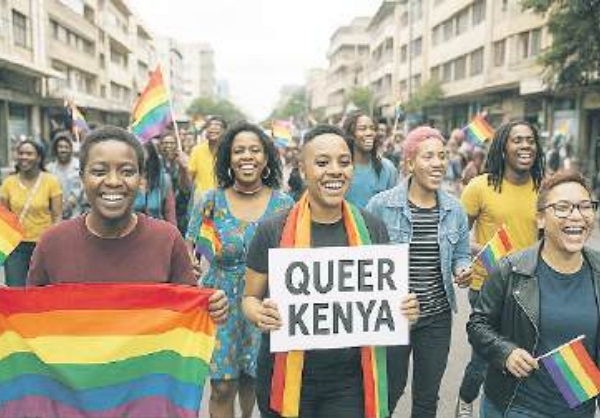
Queer teacher’s quest to be judged by ability
Ty* believes life is more fluid and complex than the society allows.
The study says sexual and gender minorities continue to face widespread human rights violations, fuelled by deep-seated societal discrimination
In Summary

Audio By Vocalize

If not getting evicted from their rented houses, queer and sexual minority Kenyans are trolled online or waylaid by organised groups who strip them naked out of curiosity, in order to physically and sexually violate them.
A new report shows that the country is deeply socially conservative and a hell-hole for sexually different people, subjecting them to untold physical, emotional and technological violence that leaves them traumatised—if not, at worst, dead.
The report, titled ‘Lives on the Line: Violence and Discrimination Against Sexual and Gender Minorities in Kenya’, is published by the Kenya Human Rights Commission.
It is based on a study conducted through a purposive sampling method to select participating organisations, focusing on those actively engaged in advocacy, data work and service provision within the LGBTIQ+ and Sexual and Reproductive Health and Rights sectors.
The report says sexual and gender minorities continue to face widespread human rights violations, fuelled by deep-seated societal discrimination and laws that criminalise same-sex relationships.
A total of 682 cases of harassment were documented across multiple regions.
These included 50 cases of sexual harassment and 100 instances of verbal abuse. The psychological toll on victims was significant, with 88 cases of depression, 77 cases of post-traumatic stress disorder, 40 cases of anxiety and five reported suicide attempts. One case involved substance abuse linked to trauma and five individuals expressed suicidal ideation.
The study found that stigma, rejection and discrimination – often from family, service providers and the wider public – deepened feelings of alienation and hopelessness, severely affecting victims’ mental health and quality of life.
On physical and sexual violence, the study captured 440 cases of physical assault, 91 instances of rape or sexual assault and 292 cases of emotional abuse. Housing insecurity was another pressing concern, with 102 evictions recorded. There were also 43 cases of unlawful arrests and 149 incidents of intimate partner violence. These attacks were not without serious health consequences.
The
report documented 13 cases of abortion complications, 17 gynaecological issues,
five sexually transmitted infections and five unplanned pregnancies, all linked
to acts of violence.
“While Article 28 of Kenya’s Constitution affirms every individual’s inherent right to dignity and protection from degrading or inhumane treatment, the data paints a blunt picture. Many of the violations were perpetrated by people known to the victims, with 235 respondents identifying familiar assailants, while 110 said their attackers were strangers,” it reads.
In terms of regional spread of the cases, the study found that the Coast region leads the rest of the country in the harsh treatment of gays and lesbians.
“The counties of Nairobi, Thika and Machakos and the Coastal region emerged as the most affected areas for sexual and gender minorities, accounting for 1,836 reported cases – or roughly 85 percent of all documented violations nationwide,” it says.
“These regions were also the epicentre of organised anti-LGBTIQ+ protests, where state and non-state actors actively spread misinformation, incited public hostility, and, in extreme cases, issued death threats against queer communities.”
Following the Supreme Court's decision affirming the right to association for LGBTIQ+ groups in 2023, anti-gay protesters – led by religious associations, including Muslim and Christian groups – called for the removal of the judges involved.
Despite these threats, the report says, sexual and gender minorities in Nairobi, its surrounding towns and the coastal region benefit from higher visibility and stronger advocacy networks.
“The presence of active LGBTIQ+ organisations has helped raise awareness, defend rights and provide spaces for community expression. Compared to rural areas, these regions offer relatively more freedom for individuals to express their identities, encouraging reporting and facilitating more comprehensive documentation of violations.”
Instant analysis
The report paints a grim picture of systemic abuse rooted in both cultural norms and legal frameworks. Despite some progress in urban areas, the pervasive hostility highlights a nationwide crisis in human rights protection for queer Kenyans.

Ty* believes life is more fluid and complex than the society allows.